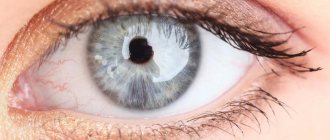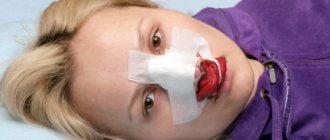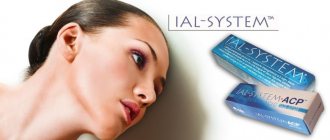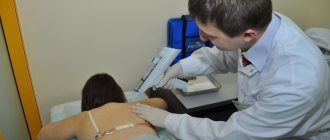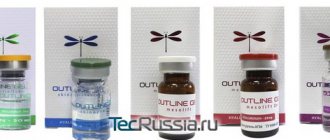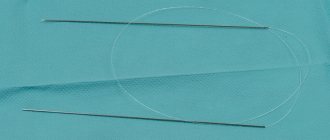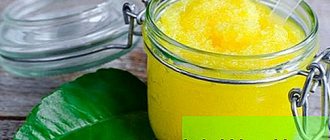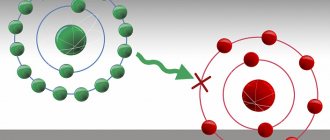Why can the face swell due to allergies and how to relieve swelling?
Allergic swelling of the face is a complex condition that requires urgent qualified help. This symptom is an immediate reaction of the body to an allergen, as a result of which the permeability of the vascular walls increases, fluid accumulates in the tissues, which causes swelling. Treatment of allergic swelling of the face should be immediate, as in the absence of necessary measures the condition quickly worsens. As dangerous complications: Quincke's edema, development of anaphylactic shock with a fatal outcome. If the face is swollen, measures can be taken for emergency first aid, but the appearance of such a symptom requires a visit to a specialist to prescribe therapy.
Causes of facial swelling due to allergies
If your face is swollen due to allergies, then this is a clear signal of pathological processes occurring in the body. Edema is the result of an immediate reaction to an allergen, in which fluid accumulates in the tissues, disrupts water metabolism and increases the permeability of the vascular walls. There are several reasons for this phenomenon, most often it is an allergy to food, medications, cosmetics or pollen. The first signs can easily be confused with causes of facial swelling such as cardiovascular, renal, and liver problems. But, unlike such edema, with allergies the entire face is affected, the tongue swells, and veins begin to protrude.
Why does my face swell? The main provoking factors are:
- local anesthetics, antibiotics (this reaction is most often observed during dental treatment);
- penicillin, cephalosporins;
- some vaccines and serums used for specific therapy (anti-snake serums, medications for the treatment of acute poisoning, infections, DTP vaccine);
- bites of spiders, insects (most often the reaction is observed with the bites of bees, wasps);
- household chemicals, especially volatile ones, washing powders;
- food products (the list is quite large, but most often these are bee products, nuts, almost all seafood, chicken protein);
- sudden change in climate zone;
- plant pollen, flowering period, poplar fluff;
- dust mites, pets (this applies not only to dogs and cats, but also to birds);
- incorrectly selected cosmetics, low quality cosmetics.
Swelling of the face due to allergies can develop at any age, but usually a similar phenomenon is observed in children and adolescents. The most common allergens are food, medications, fluff and animal hair. In infants, a reaction may develop due to the use of artificial baby food.
Causes
Extensive swelling develops upon contact with allergens, which are of a different nature. Most often, this reaction occurs to:
- Food products.
- Medicines.
- Plant pollen.
- Animal fur.
- Cosmetical tools.
- Chemical substances.
- Insect bites.
A visit to the doctor will help to identify the true cause of the swelling. The allergist will interview the patient, prescribe medication for treatment, and perform allergy tests.
There are several types of allergies, depending on the cause of their occurrence. Testing will help identify what led to the development of unpleasant symptoms.
Often this reaction of the body is seasonal, but in any case, in order to get rid of swelling of the soft tissues, it is worth limiting contact with the allergen.
Symptoms and mechanism of edema development
With an allergy, the face begins to swell very quickly; usually there are no external signs of a reaction, which makes this condition extremely dangerous. Deterioration also occurs rapidly, literally before our eyes; if no measures are taken, anaphylactic shock is possible, often leading to death.
It is very important not to confuse allergic swelling with symptoms of other diseases. The following symptoms are typical for allergies:
- the onset is rapid, swelling affects the entire face and the condition worsens literally before our eyes;
- at the moment of the reaction, the patient feels a strong wave of heat, as if exposed to strong sun for a long time;
- clinical manifestations increase very quickly, affecting the skin, subcutaneous fat, and mucous membranes;
- All tissues are involved in the process, but it is not uncommon for a situation in which the reaction affects only the oral cavity with severe swelling of the tongue - the patient cannot speak, close his mouth, or breathe normally.
In particularly difficult cases, the following symptoms may be observed:
- shortness of breath, a feeling of lack of air and other signs of damage to the bronchopulmonary tree appear;
- the membranes of the brain are involved in the process;
- Extremely complex and dangerous lesions of the systemic bloodstream are observed, accompanied by anaphylactic shock and collapse.
To relieve allergic swelling, you should understand the process of development of this symptom. In the first moments of penetration of the allergen, the synthesis of antibodies begins, that is, special protein compounds that can fight the irritant. If repeated contact is observed, the allergen combines with antibodies, and the immediate synthesis of biologically active substances begins. They cause an increase in the permeability of the tissues of the eyes and face, causing a biochemical process such as edema.
First aid
What to do when the first signs of swelling appear? To alleviate the condition and eliminate dangerous complications, it is necessary to immediately take first aid measures:
- Contact with the allergen should be stopped immediately if the irritant is known;
- further, immediate use of any antiallergic drug is necessary, including the most effective ones such as calcium chloride, Tavegil, Loratadine (many of them cause drowsiness, this must be taken into account by everyone who is driving or whose professional activity requires increased attention);
- the patient must be reassured;
- even if the swelling begins to subside, you need to immediately call an ambulance.
Attention! In case of allergic edema, all actions should be as quick and clear as possible. The life of the victim depends on it.
Complications
The consequences of contact with an allergen can cause death. Under unfavorable conditions, the following are observed: anaphylactic shock, Quincke's edema, allergic eczema.
Anaphylactic shock is a severe complication that develops against the background of repeated contact with the pathogen. More often diagnosed in women and children. The symptoms of anaphylactic shock are pronounced, swelling progresses rapidly and in 20% of cases leads to death. The effect of the allergen is comparable to the poison that enters the body when a snake bites; if an antidote is not administered, then the death of a person is inevitable. In the case of anaphylactic shock, the “antidote” is an antihistamine.
Quincke's edema is severe allergic swelling of the eyes or face. It develops very quickly, the most dangerous is swelling of the larynx, which leads to difficulty breathing and attacks of suffocation. Treatment is long-term and involves taking medications and vitamin complexes.
Health care
Allergic swelling can be professionally removed only in an emergency department or in a specialized center. For this, the use of the following medications is recommended:
- sorbents for removing allergens and toxins from the body (usually Enterosgel is prescribed);
- the administration of glucocorticosteroids (Prednisolone or Dexamethasone) is prescribed, which allows you to quickly suppress the pathological process;
- to reduce swelling, diuretics are prescribed (usually Mannitol, Lasix);
- To effectively combat the reaction, fast-acting and first-generation antihistamines (Tavegil, Pipolfen, Diphenhydramine) are prescribed.
After the swelling has been removed, further treatment will be prescribed, which can last up to 10-14 days, depending on the general condition of the patient. Usually this is a course of Fexofenadine or Cetirizine; various preventive measures may be required, including avoiding contact with the allergen, for example, you should not be exposed to the sun or the street during the flowering period of plants. Therapy is carried out only under the supervision of a doctor, which includes the following steps:
- first you need to determine the type of irritant in order to completely eliminate contact with it;
- collection of tests, determination of sensitivity to a number of drugs;
- a course of vitamin therapy;
- regular examination by a supervising specialist (for particularly complex conditions, treatment is carried out only in a hospital);
- using folk recipes to support the body at home (only with the permission of a doctor).
How to relieve swelling at home? Usually these are herbal infusions to remove fluid from the body, the use of decoctions of burdock or dandelion roots. But before taking it, you must definitely consult with a supervising specialist so as not to worsen the condition.
Swelling of the face due to allergies is a rather dangerous phenomenon that requires immediate first aid measures and further qualified treatment. You cannot let the situation get worse, as in the future this can lead to serious deterioration in your general health and the development of dangerous complications such as anaphylactic shock.
source
Causes and treatment of allergic swelling of the face at home
Any allergic reaction is accompanied by redness of the mucous membranes, the appearance of a skin rash, itching and swelling of the soft tissues. Allergies often manifest as swelling of the face, since swelling develops in soft tissues - eyelids, lips and cheeks. Allergic swelling of the face disappears within half an hour after the influence of the allergen is eliminated. Before taking measures to eliminate it, it is necessary to find out the causes of the allergy.
Allergies, manifested by rapid swelling of the face, are provoked by various factors, including:
- Food;
- pharmacological drugs;
- household chemicals;
- facial cosmetics;
- color of allergenic plants;
- animal hair;
- bites of blood-sucking insects, snakes.
Allergy symptoms include swelling of the skin of the eyelids, cheeks and lips. There is also itching in the nose and eyes, which is accompanied by tearing and redness of the proteins.
Allergic swelling of the face and other symptoms of an allergic reaction should never be ignored, especially when it comes to the health of the child. Lack of first aid for allergies increases the risk of angioedema - a dangerous condition manifested by swelling of the mucous membranes of the respiratory system, which leads to difficulty breathing and suffocation.
With angioedema, which manifests itself as dense puffiness of the face, severe swelling of the eyelids and lips, the patient needs immediate medical attention.
With allergies, the face swells when exposed to a strong allergen; antihistamines will help eliminate it:
We advise you to read: How long does swelling last after maxillary sinusotomy?
The drugs are taken in accordance with the instructions. Antihistamine ointments are used if redness and itching occur on the skin. Potent hormonal antihistamines are taken only after consultation with a doctor.
To prevent the reaction from happening again, it is necessary to eliminate exposure to possible allergens: food, medications, etc.
To speed up the removal of allergens from the body and relieve swelling, you need to take a sorbent at home: Activated carbon or Enterosgel.
Traditional methods of treating facial swelling of an allergic nature are aimed at removing excess fluid from the body, reducing the area of swelling and cleansing the body of the allergen. Recipes can be used for both adults and children.
To quickly cope with swelling on the face, you can make effective lotions and compresses according to the following recipes:
| Folk remedy | Recipe | Application |
| Cucumber | Take a fresh cucumber and cut it into thin slices | Cover the entire facial skin with slices for 10-15 minutes. This method of eliminating edema is suitable for both adults and children |
| Green tea | You need to brew a glass of strong green tea. When the drink has cooled, they need to soak the cotton pads | A green tea compress applied to the area around the eyes for 20 minutes will help cope with severe swelling of the eyelids. |
| Milk | Gauze is soaked in milk at room temperature | The compress is applied to the face for 15 minutes. |
| Herbal collection |
| Soak several cotton pads in the herbal infusion and wipe the skin with them. |
| Flax seeds |
| Soak a gauze compress with the resulting liquid and apply it to the skin for 15 minutes. |
| Birch tar with fat |
| The ointment is applied to areas of the face where severe swelling and rash have appeared. |
If your face is swollen, the internal use of infusions of medicinal plants that have a detoxifying effect will help speed up the treatment of allergies.
| Folk remedy | Recipe | Application |
| Infusion of bear ears |
| Drink 1 tbsp. l.four times a day before meals |
| Infusion of dandelion and burdock roots |
| Drink half a glass twice a day before meals |
To avoid allergies, it is necessary to limit exposure to triggering factors as much as possible. To find out which allergens affect the body, you need to undergo appropriate medical tests.
source
What to do if your face is swollen from allergies?
Allergy is a pathological condition that occurs as a result of the body’s incorrect perception of a particular irritant in the environment. Allergens can be some foods, animal dander, chemical compounds, pollen, dust, medications, and sometimes people are even allergic to the sun.
Allergic reactions can manifest themselves as a skin rash, irritation, redness of soft tissues, tearing, itching, etc. Much less common is the formation of severe swelling, usually at the site of skin contact with the irritant. This condition is very dangerous and requires immediate medical attention, as it can lead to serious complications.
In this article, we will take a closer look at why allergic facial swelling occurs, how it manifests itself, why it is dangerous, and what methods exist to eliminate it.
Causes of swelling
Facial swelling due to allergies occurs due to the negative effects of the allergen on the body.
With such a pathological reaction, blood circulation slows down, the metabolic process worsens, and fluid accumulates in the affected area (most often on the face), increasing the volume of soft tissues.
This condition requires immediate professional intervention, as it entails irreversible consequences.
Allergies manifested by swelling can develop due to exposure to the following irritants:
- Some food products (honey, nuts, chicken protein, citrus fruits);
- Pharmacological drugs;
- Insect, arachnid, wasp or bee bites;
- Chemical, household products;
- Flowering pollen, poplar fluff;
- Dust, house mites;
- Animal wool (cats, dogs, rabbits, birds);
- Poor quality cosmetics.
Main symptoms
Swelling in the facial area occurs very quickly. Enlarged areas can block the airways and eyes, causing the person to feel serious discomfort.
In addition to extensive facial swelling, additional symptoms of an allergic reaction include:
- Redness of the skin;
- Swelling of the eyelids (the eyes are almost invisible) and swelling of the lips;
- The skin becomes overly tense;
- The appearance of a small rash;
- Severe itching in the area of fluid stagnation.
Swelling that occurs due to allergies must be eliminated immediately. This should be done by a qualified doctor to prevent the condition from worsening.
What could be the danger?
Untimely assistance entails the development of dangerous conditions due to swelling. In severe situations, the victim’s tissues near the mucous membranes, tongue, and nose swell. Such phenomena interfere with swallowing and normal breathing.
Also, due to severe swelling, a person may lose consciousness, and the meninges and blood vessels may be affected. The patient begins to develop anaphylactic shock and collapse.
First aid
Every person should know how to help an allergy sufferer with facial swelling. The subsequent effectiveness of treatment depends entirely on first medical aid. In case of severe swelling, the following emergency measures should be taken:
- Immediately remove the allergen (if it is, for example, a bee sting, wasp sting, chemical substance) from the body or take the patient to a safe place where there are no dangerous irritants;
- Take an antiallergic drug (Loratadine, Tavegil, calcium chloride);
- Try to restore the patient’s calm state;
- Call an ambulance immediately.
All the described actions must be quick in order to maximally improve the allergy sufferer’s condition and prevent dangerous complications.
Medical care and treatment
Professional, emergency care should be provided by medical professionals. It includes the following activities:
- The use of sorbents, which provoke the removal of allergenic components and dangerous toxins from the victim’s body (Enterosgel);
- Glucocorticosteroid drugs are administered to eliminate the progression of the unfavorable process (Pridnisolone, Dexamethasone);
- To relieve swelling and remove excess fluid, diuretics (Lasix, Mannitol and others) are used;
- Allergy symptoms can be relieved with the help of fast-acting anti-allergy drugs (Pipolfen, Tavegil, Diphenhydramine).
After emergency medical care is provided, the patient is taken to a medical facility to determine the cause of the swelling and prescribe effective therapy.
To determine the allergen, a special analysis is carried out, during which the doctor ensures contact of various irritants with the skin of the allergic person and observes the reaction. Blood and urine are also sent for testing. Only after diagnosing and determining the nature of the allergy can the doctor begin prescribing treatment, which lasts two weeks.
Therapeutic measures must be comprehensive. First of all, the doctor prescribes antihistamines: Cetirizine or Fexofenadine.
During treatment, you must completely limit yourself from contact with the irritant.
To restore the functioning of the immune system and regulate important processes, a vitamin complex is also prescribed. During the period of therapy, the patient must periodically visit the doctor so that he monitors his condition and, if treatment is unsuccessful, explains what to do next and what medications to use.
Traditional medicine is often used to relieve facial swelling and reduce allergic reactions. However, their use must be agreed upon with your doctor, since in most cases self-medication ends in disastrous consequences.
Effective ways to relieve swelling
There are effective folk methods that allow you to remove allergic swelling from the face and eliminate unpleasant signs of pathology. To do this, you can use the following recipes:
- A spoonful of Bear's Ears herb is thoroughly crushed and poured with 200 milliliters of boiled water. For two hours, the resulting liquid is infused in a dark, cool place, then filtered and consumed in a tablespoon 15 minutes before meals;
- Two tablespoons of crushed dandelion and burdock root are poured into 800 ml. boiling water, then cover with a lid and leave in a darkened room for 24 hours. After the specified exposure, the resulting product is filtered and consumed one glass (about 200 ml) before each meal;
- Two tablespoons of cranberries are crushed and the juice is separated from the pulp. The pulp is filled with water and placed on low heat until it boils. After this, all the ingredients are mixed in one container, filtered and consumed one glass 3-4 times a day.
Traditional medicine recipes are distinguished by their safety and effectiveness, but even their use requires consultation with your doctor.
What is prohibited to do
If your face is swollen due to allergies, then every person should know what actions are strictly prohibited in such a situation:
- The use of medications containing alcohol is not allowed;
- Do not allow hygiene products (soaps, gels, etc.) to come into contact with the affected area;
- Do not scratch the skin;
- Masking allergic reactions with any cosmetic products is not allowed.
Source: https://OtekoVed.ru/litso/otek-ot-allergii
Types of edema, first aid, duration of edema
There are two types of edema: local reaction to an allergen and angioedema. In the first case, you will experience slight swelling, itching or rash. This condition can be treated at home. In the second case, there is severe swelling of the face, tongue, throat, and upper eyelids. This is a serious condition in which you need to call a doctor immediately.
To provide first aid, eliminate the allergen, take a horizontal position, take antihistamines, open access to fresh air, and apply a cold compress. If the allergy is caused by food or medications taken orally, do a rinse. If this does not help, call for medical help.
It is forbidden to wash your face with soap, scratch yourself, wipe your skin with alcohol, or apply makeup.
Facial swelling lasts up to 6 weeks if you do not take any measures. Treatment will reduce this period to a week.
Below you will learn more about how this pathology occurs in children, adults, and pregnant women. You will find more detailed ways to combat the problem with medications and folk remedies.
Causes of facial swelling due to allergies
If your face is swollen due to allergies, then this is a clear signal of pathological processes occurring in the body. Edema is the result of an immediate reaction to an allergen, in which fluid accumulates in the tissues, disrupts water metabolism and increases the permeability of the vascular walls.
There are several reasons for this phenomenon, most often it is an allergy to food, medications, cosmetics or pollen. The first signs can easily be confused with causes of facial swelling such as cardiovascular, renal, and liver problems.
But, unlike such edema, with allergies the entire face is affected, the tongue swells, and veins begin to protrude.
Why does my face swell? The main provoking factors are:
- local anesthetics, antibiotics (this reaction is most often observed during dental treatment);
- penicillin, cephalosporins;
- some vaccines and serums used for specific therapy (anti-snake serums, medications for the treatment of acute poisoning, infections, DTP vaccine);
- bites of spiders, insects (most often the reaction is observed with the bites of bees, wasps);
- household chemicals, especially volatile ones, washing powders;
- food products (the list is quite large, but most often these are bee products, nuts, almost all seafood, chicken protein);
- sudden change in climate zone;
- plant pollen, flowering period, poplar fluff;
- dust mites, pets (this applies not only to dogs and cats, but also to birds);
- incorrectly selected cosmetics, low quality cosmetics.
Swelling of the face due to allergies can develop at any age, but usually a similar phenomenon is observed in children and adolescents. The most common allergens are food, medications, fluff and animal hair. In infants, a reaction may develop due to the use of artificial baby food.
Causes of allergies
There are about 300 thousand irritants that can cause swelling of the facial skin, so it is almost impossible to determine the culprit. The main reason for intolerance to a particular substance is genetic predisposition. The catalyst is a weakened immune system, vitamin deficiency, which results in a certain reaction to the introduction of a foreign protein into the body.
Allergenic components are classified into groups. The body produces antibodies to the introduction of the “aggressor”. Histamine and prostaglandin are released from the cells, which causes dilation of blood vessels, redness, inflammation and allergic swelling of the facial skin.
Provoking factors may include climate, unfavorable environmental problems and stressful situations. What to do if the variety of irritants makes it difficult to identify the cause. Self-treatment is impossible; you will need to consult an allergist and immunologist.
Allergic swelling of the face: why is it dangerous?
At the moment, there are more than 300 thousand substances to which a person can have an allergic reaction, so it is almost impossible to determine the one to which you have allergic swelling of the face.
Therefore, when you notice the first signs of an allergy: swelling of the lips or eyelids, changes in skin color, itching, take one of the antihistamines such as tavegil, suprastin, diazolin and wait for a while. If after a few hours the swelling does not subside, you should definitely consult a doctor.
Your life may depend on the promptness of contacting a doctor, since in some cases a complication of allergic manifestations is Quincke's edema.
Quincke's edema is a diffuse or limited swelling of the subcutaneous fatty tissue and mucous membranes, developing suddenly and quickly. Young women and children are more susceptible to it.
Its appearance is based on the body’s reaction to any allergen, which causes local dilation of veins and capillaries, as well as an increase in vascular permeability.
Note! Those people who have developed an allergy accompanied by angioedema at least once in their life are at risk of its reoccurrence. Therefore, it is vital for them to avoid any contact with the allergen and have with them a card indicating the substance - the allergen.
Among the main reasons for the occurrence of such edema may be the consumption of specific foods, as well as certain medications. The main signs of such edema are swelling of the eyelids, lips, mucous membranes of the mouth, respiratory tract, etc.
We advise you to read: Clinical manifestations of urticaria and angioedema and emergency care
Most often, it occurs painlessly, but quickly, while tissue tension is noted in the area of edema. For example, if you press on a damaged area of skin with your finger, no external changes will occur.
As a rule, such swelling forms on the lower lip, tongue, larynx, cheeks and can lead to difficulty breathing - suffocation.
Remember that self-medication under such circumstances is fraught with dangerous consequences, including death, so if you detect such obvious allergic swelling of the face that does not disappear on its own over time, be sure to consult a doctor! Don't hesitate, because your life is in your hands!
In adults and children
The pathology is extremely dangerous when edema of the laryngeal mucosa develops, since the tissues “swell” so much that they can seriously complicate breathing.
This condition poses a real threat to the life of children, in whom the small lumen of the larynx is blocked in almost minutes, and subsequent suffocation kills the child.
- In younger children (under 2 years of age), the pathology occurs rarely - in only 2% of case histories. But infants can also develop Quincke's edema. Pediatricians are increasingly seeing a combination of swelling and urticaria (an allergic reaction with red, itchy rashes and blisters).
- For women expecting a baby, angioedema can also cause serious complications due to swelling and dysfunction of organs, possible oxygen deficiency caused by swelling of the airways, which has a harmful effect on the health of the fetus, as well as the danger of using many medications, which makes it difficult providing emergency care and treatment of illness.
- At 13–17 years of age, the disease is often more severe, which pediatricians associate with hormonal changes caused by puberty in adolescents.
- This type of disease is rarely observed in older people.
In pregnant women
Physiology changes during pregnancy and a woman's susceptibility to allergens increases many times, and swelling of tissues and organs is not uncommon. The likelihood of angioedema especially increases in the 2nd half of pregnancy.
Moreover, allergies suddenly arise even to those foods, medications and substances that did not give a pathological reaction before pregnancy.
In pregnant women, Quincke's edema is often accompanied by symptoms of giant urticaria, expressed by swelling of the face, the appearance of itchy red blisters, stomach cramps, a sharp rise in blood pressure, shortness of breath, palpitations and the presence of protein in the urine.
Such pathological phenomena can significantly affect the development of a fetus suffering from oxygen deficiency, the course of pregnancy, the health and even the life of the mother. Moreover, many pharmacological drugs used in the standard treatment regimen for angioedema are contraindicated at this time.
Therefore, even the slightest signs of incipient swelling should be a reason to immediately call an ambulance service.
Folk remedies for allergic swelling of the face
Allergies develop in response to the penetration of foreign proteins into the body. Allergens in people with hypersensitivity cause rhinitis, joint pain, bronchospasm, rashes, itching and swelling on the body. Allergic swelling of the face, arms, and legs often develops.
Causes
There are a great variety of allergens, so it is extremely difficult to determine the cause of facial swelling. In some cases this cannot be done at all. An allergic reaction is caused by:
- animal hair;
- certain foods;
- plant pollen;
- dust;
- insect bites;
- household chemicals;
- cosmetics.
With allergies, facial swelling occurs in patients with a genetic predisposition. It can be caused by unfavorable climatic conditions, unfavorable environment, and stress.
Sometimes swelling on the face is the first symptom of the most severe form of pathology. Only a doctor can understand the causes and create an effective treatment regimen. Self-medication for allergic reactions accompanied by swelling is extremely dangerous. They can develop into angioedema, a life-threatening condition that can lead to suffocation, anaphylactic shock and death.
Types of edema
There are several types of swelling on the face, which are not prone to total spread. They are localized in a certain segment: on the cheek, eyelids, lips. The location of the swelling is influenced by the reasons for its occurrence. Swellings appear in the following areas:
- On the upper eyelids. Their cause is a certain type of food: berries, citrus fruits, nuts.
- On the upper lip. Swelling occurs after insect bites, taking medications, or due to cold. The causes of lip swelling are often foods, medications, pollen, cosmetics and other allergens .
- In the nasopharynx. The nasopharynx swells during an allergic reaction to dust, fur, or pollen.
The mechanism for the development of swelling is the same for any reason. When a foreign protein penetrates into the body, a response begins and antibodies are intensively produced.
At the site of entry of the allergic agent, prostaglandins and histamines are synthesized - substances that dilate capillaries. Fluid leaks from the blood vessels into the interstitial space.
At the site of its accumulation, redness, swelling and inflammation occur.
Symptoms
In some situations, swelling develops immediately, in others - with a delay. Some time passes from the action of the allergic agent to the appearance of swelling. First, the tongue, larynx, and lips usually swell. The swelling gradually subsides or begins to grow, affecting the legs, arms, genitals and other parts of the body.
In addition to swelling, there is:
- rash;
- itching;
- rhinitis;
- redness or paleness of the skin;
- spasms in the larynx.
Nasal congestion is another telltale sign of an allergic reaction. Some people have a reduced or lost sense of smell.
You can distinguish allergic edema from swelling of another origin by a characteristic feature: if you press on the skin with your finger, there will be no dent left on it.
First aid and precautions
The main treatment for swelling on the face is prescribed by the doctor. But sometimes, when allergies develop, patients need emergency first aid. It is rendered as follows:
- Place a cold compress on the swelling.
- Wash the skin with clean water.
- Make lotions with boric acid. To do this, dissolve 1 teaspoon of powder in 200 ml of water. Soak a napkin in the solution and apply it to the swelling.
- They give an antihistamine.
In case of allergic edema it is prohibited:
- use alcohol-containing products;
- wash the skin with soap, gels, and foam cleansers;
- scratch the itchy spot;
- cover up rashes with cosmetics.
Drug therapy
To quickly cure an allergy, it is necessary to identify its causative agent and suppress its effect on the body. It is impossible to do this on your own. The allergen is determined by conducting special tests.
A patient in whom it has been possible to differentiate the allergic agent is treated with the method of hyposensitization . The patient is injected with tiny doses of a substance that provokes an allergy. The body gradually gets used to the irritating compound. As a result, the protective reaction when an unwanted substance enters the body ceases to develop.
If the patient does not have the opportunity to be treated using this method, he is prescribed antihistamines. In severe cases, the patient is treated with glucocorticoids.
In case of gastrointestinal disorder, the patient is sent for consultation to a gastroenterologist. He prescribes medications that improve the functioning of the digestive system.
Allergic edema caused by food can be relieved by adjusting the diet. All foods that give pathological reactions are removed from the menu.
Treatment using traditional medicine methods
Folk remedies help relieve swelling due to allergies. Herbs reduce swelling and block histamine synthesis. But they are used after consultation with the doctor. If left uncontrolled, allergies can cause serious complications.
The following remedies help remove swelling from the face:
- For swelling, lotions should be made from steamed flaxseed. Take 1 tablespoon of seeds, grind them into powder, pour into ½ cup of hot water, and allow to swell. The cooled pulp is placed in a gauze napkin and secured to the swelling. Leave for 15 minutes. The procedure is performed for an hour, periodically applying fresh lotion.
- Tar ointment is a good home remedy for allergic rashes. Mix 100 g of pork fat with 2 tablespoons of tar and 3 g of sulfur. In the evening, the ointment is applied to a swollen cheek or other problem area.
- Bear ear extract quickly removes excess fluid from the interstitial space . Place 1 teaspoon of the plant in 250 ml of boiling water. After cooling, the extract is filtered. Take 1 tablespoon of the medicine on an empty stomach. Eat after 20 minutes. The swelling subsides on days 5-7 of treatment.
- Puffiness on the eyelids is relieved using fresh cucumber. Slices of the vegetable are applied to swollen eyelids for 15-20 minutes.
- Pears effectively remove excess fluid from the body. You should eat 5-7 fresh fruits daily. In winter, compote made from dry pears is used for treatment. They drink it instead of tea. A mild natural remedy is used to treat allergic edema in children and adults.
- If you have a negative reaction to ultraviolet radiation (sun), make a mask from egg white. This is an excellent folk way to combat swelling on the face. Take an egg, separate the white, and beat it into a foam. Apply the prepared product to problem areas several times throughout the day. The dried mask is washed off and a rich cream is rubbed into the skin.
- Diuretic herbal extracts are used to relieve swelling. They remove excess fluid and return the face to its previous appearance. Boil 250 ml of water, add 1 teaspoon of thyme to it. The extract is filtered after cooling. Take 1 tablespoon on an empty stomach 3 times a day. Treatment lasts 7 days.
- Asparagus quickly eliminates puffiness on the face. Salads, appetizers and other dishes are prepared with it. A cocktail made from apples, asparagus and carrots effectively fights swelling. Juice is squeezed out of the products. Mix the drinks as follows: combine 50 ml of carrot and asparagus juice. Add 100 ml of apple juice to the mixture. Take the medicine once a day in the morning, before breakfast.
- A mixture of dandelion and horsetail is an effective herbal mixture for the treatment of edema . The herb is mixed in equal quantities. Place 1 tablespoon of the mixture in 1 liter of boiling water and simmer for 5 minutes. The cooled extract is filtered. Drink 200 ml 3-5 times a day. The medicine has a diuretic and antihistamine effect.
If the patient knows that his face may periodically swell, he must carefully use cosmetics, control his diet, and exclude undesirable foods from it. You should follow a drinking regime (drink 1.5-2 liters of water daily), eat a large amount of fresh vegetables and fruits.
Source: https://FitoOtvet.com/raznoe/narodnye-sredstva-pri-allergicheskom-oteke-litsa.html
Allergic swelling on the face - symptoms
There are about 300 thousand substances that can be allergens and cause swelling in dangerous forms. Typical areas of swelling are the tongue, lower lip, larynx, and cheeks. They increase significantly in size, leading to suffocation.
Allergic swelling of the face should be treated by a doctor. Self-medication can worsen symptoms.
It is necessary to provide emergency treatment, as minutes count in such situations. You should not self-medicate, as delay can be fatal. Treatment must be immediate and qualified - only this will save lives.
Typically the symptoms of the disease are as follows:
- the patient's eyelids and lips have multiple swellings;
- skin color changes;
- severe itching along with swelling of the affected areas.
- rash in the form of hives.
Often, the patient does not experience pain when edema develops, and the symptoms of the pathological condition themselves develop very quickly. The tissues in the area where excess fluid accumulates are so tense that they don’t even bend when pressed.
To treat these manifestations, an antihistamine is administered to relieve allergic swelling and the swollen areas are monitored. If there is no therapeutic effect, you should immediately call a doctor. The introduction of a stronger drug with its help will quickly eliminate the symptoms of facial edema.
Swelling can occur not only due to allergies, but also due to heart disease and kidney disease, which also needs to be taken into account.
Symptoms
Since swelling occurs in the soft tissues of the face, it most often affects the lips, eyelids and eyes. The main signs of pathology are:
- severe itching;
- swelling in the lips or eyelids;
- redness of soft tissues.
In addition, a person may experience other unpleasant symptoms associated with manifestations of an allergic reaction:
- Increased body temperature (even fever).
- Hives.
- Intense heat.
Allergic swelling of the face develops quickly, symptoms occur spontaneously. This problem progresses due to the accumulation of fluid in the layers of adipose tissue.
Pathogenetic factors
An allergic reaction develops against the background of the following 6 pathogenetic factors:
- Hydrodynamic - edema is associated with intercapillary moisture exchange. If the pressure in the capillaries is higher than in the tissues, fluid from the vessels will enter the tissue. In the venous part, this process is reversed.
- Membrane - pathogenetic factor is directly related to the increased permeability of vascular and tissue membranes. If permeability is high, fluid circulation is facilitated. Increased permeability is associated with histamine, characteristic of allergies.
- Osmotic - swelling of the face due to allergies is explained by the accumulation of electrolytes between the tissues.
- Oncotic - pressure in tissues increases. Fluid begins to accumulate in the circulatory system. Against the background of pathogenesis, the level of proteins in the blood decreases.
- Lymphatic - allergic swelling of the face is associated with stagnation of lymph.
- Low blood pressure - observed with inflammation and disorders associated with damage to toxins. With such phenomena, the tissue becomes soft and loose. She is unable to retain liquid.
In its pure form, such pathogenesis of throat swelling due to allergies is rarely observed. Several factors are involved in the edematous process. To identify them, you will need the help of a doctor. The condition in question can occur at any time of the day. In this case, the type of allergy does not play any role.
- from the cause of swelling;
- from the presence of a concomitant disease;
- depending on the type of allergen.
Swelling of the face, nose, and lips is more common. Allergies can affect the functioning of the entire body.
How to recognize the type of allergy?
The two types of swelling of the face and eyes carry different degrees of danger and require different responses.
A local reaction caused by skin contact with an allergen is characterized by:
- skin disorders in the form of spots, rashes with itching and slight swelling;
- the place of direct contact has more pronounced manifestations;
- The general condition of the body is stable, the only concern is skin rashes.
You can survive this scourge at home using folk remedies and sorbents. It should be noted that facial swelling in a child with allergies can be significant, even with local exposure.
Quincke's edema requires timely hospitalization and treatment in a hospital, so calling an ambulance is required.
- significant accumulation of fluid in the tissues, which is expressed in swelling of the face, mucous membranes of the mouth, tongue, throat, the upper eyelids swell most severely;
- change in general condition - pallor of the skin, drop in pressure, lack of air, difficulty breathing, vascular spasms.
The condition is very serious and is not limited to skin manifestations. Sometimes, with significant contact with an allergen, urticaria turns into angioedema and also requires urgent hospitalization.
How to deal with the problem?
The first thing to do is to avoid contact with the allergen. After this, it is necessary to provide first aid to the victim: rinse the reddened skin with cool water and give an antiallergic tablet.
Do not wash your face with soap or use alcohol-containing liquids or cosmetics. Next, you need to seek help from a doctor.
Treatment methods are selected based on the severity of the allergic reaction. In some cases, it is possible to relieve swelling and eliminate other local manifestations using folk remedies; in other situations, it is necessary to take systemic antihistamines.
In general, treatment for allergic swelling on the face includes:
- The use of antihistamines (tablets or injections) - Suprastin, Diphenhydramine, Tavegil.
- Taking sorbents (Activated carbon, Enterosgel).
- If an infection occurs, the patient may require antibiotic therapy.
- Hormonal drugs - Hydrocortisone, Prednisolone, Dexamethasone.
- In severe cases, an injection of adrenaline.
- Local therapy, involving the use of pharmaceutical creams, gels, ointments or homemade mixtures (decoctions, infusions, etc.).
We advise you to read: Eye creams for swelling and bruises
As an aid, a specialist may prescribe immunomodulators and vitamins. In some cases, patients undergo hyposensitization - this is a set of therapeutic and preventive measures that is aimed at eliminating the body's reaction to an allergen (or a combination of them).
The essence of the procedures is that the patient is given small doses of an “irritant” so that the body gradually gets used to it. As a result of this treatment, the body stops actively “defending itself”, and allergy symptoms gradually disappear.
How long does swelling on the lips and eyes last after an allergy develops?
Swelling on the face is a serious case. If you do not take any measures, it does not go away for up to 6 weeks. Only under the supervision of doctors and taking medications can this period be reduced to a week.
Normal swelling lasts no more than a couple of days. In case of complications, it does not go away for about 7 days. The reaction goes away completely if the brain is not affected. Otherwise, things are a little more complicated.
If the larynx swells, then it is worth waiting a couple of days or several weeks for the swelling to completely subside. It all depends on many factors. The minimum duration of gastric edema is a week. Only after 7 days do the pain and possibly diarrhea that occurred as a result of the reaction disappear.
After the swelling has passed, you need to conduct an examination of the gastrointestinal tract. If the urinary system is affected, puffiness due to allergies will go away in a couple of days, with proper treatment.
First aid
If you notice signs of swelling on the face, you should immediately consult a doctor or call an ambulance. However, first you need to provide first aid, which will help reduce swelling.
So, how to relieve swelling on the face:
- Eliminate interaction with the allergen;
- Take antihistamines, which, by acting on blood vessels, can help relieve swelling. Suprastin, Diazolin, Diphenhydramine - fast-acting drugs;
- It is best to take a horizontal position: lie down in bed, taking the most comfortable position;
- Eliminate all sources of stress, as stress can aggravate the situation and increase swelling on the face;
- It is important to ensure access to fresh air: open the windows in the room, and also free the patient from tight, constricting clothing;
- Apply a cold compress, which helps relieve swelling and itching;
- If the cause of an allergic reaction is an allergen that has penetrated inside the body, then it is necessary to use a sorbent, rinsing and enema therapy.
Forbidden
If signs of allergic edema are detected, it is prohibited:
- Use soap or other cleansers;
- Scratch skin rashes;
- Wipe areas of skin with rashes or swelling with alcohol (alcohol-containing products);
- Apply decorative cosmetics (foundation, powder, blush).
During treatment, it is necessary to identify not only the allergen that caused the allergic reaction at the moment, but also other allergens that can also cause allergies. All identified allergens should be avoided by the patient to prevent swelling or rashes.
Health care
Allergic swelling can be professionally removed only in an emergency department or in a specialized center.
For this, the use of the following medications is recommended:
- sorbents for removing allergens and toxins from the body (usually Enterosgel is prescribed);
- the administration of glucocorticosteroids (Prednisolone or Dexamethasone) is prescribed, which allows you to quickly suppress the pathological process;
- to reduce swelling, diuretics are prescribed (usually Mannitol, Lasix);
- To effectively combat the reaction, fast-acting and first-generation antihistamines (Tavegil, Pipolfen, Diphenhydramine) are prescribed.
After the swelling is removed, further treatment will be prescribed, which can last up to 10-14 days. This depends on the general condition of the patient.
Usually a course of Fexofenadine or Cetirizine is used; various preventive measures may be required, including avoiding contact with the allergen, for example, you should not be exposed to the sun or the street during the flowering period of plants.
Therapy is carried out only under the supervision of a doctor and includes the following steps:
- first you need to determine the type of irritant in order to completely eliminate contact with it;
- collection of tests, determination of sensitivity to a number of drugs;
- a course of vitamin therapy;
- regular examination by a supervising specialist (for particularly complex conditions, treatment is carried out only in a hospital);
- using folk recipes to support the body at home (only with the permission of a doctor).
How to remove allergic swelling from the face and the causes of its occurrence
According to experts, several hundred thousand irritants can be named that can provoke an immune response that can manifest itself in any symptoms. We will tell you in this article how to relieve allergic swelling from the face, as well as what exactly can cause it.
Eliminating swelling is not difficult; timely administration of several medications is sufficient.
It is much more important to prevent its reappearance, and for this it is necessary to determine the exact cause of such symptoms.
The occurrence of swelling on the face, caused by immunological processes at the cellular level, is usually one of the varieties of a fairly common allergic disease - urticaria.
But if the symptoms of the latter are itchy rashes, areas of redness of various locations, swelling is usually not accompanied by external skin manifestations.
Its occurrence is due to an increase in the permeability of the walls of blood vessels located in the subcutaneous space.
The reasons for the development of swelling on the face can be:
- seasonal allergens, in other words, plant pollen or fungal spores;
- taking certain foods;
- staying in dusty rooms;
- inhalation of toxic fumes;
- contact with intensely smelling components of household chemicals;
- use of decorative cosmetics, creams, lotions and skin care tonics;
- insect bites;
- use of medicines.
However, every day thousands of men and women encounter such substances, but not everyone experiences allergic swelling on the face. The fact is that the main pathophysiological reason for the development of such signs is hereditary predisposition. Only in this case, the cells of the immune system react in a specific way to contact with certain compounds.
In a child, allergic swelling on the face rarely occurs. It can be caused by hypersensitivity to proteins in dairy and fermented milk products.
When breastfeeding, this reaction is caused by non-compliance with the diet by the nursing mother.
In some cases, sensitization of the child’s body occurs during the process of intrauterine development if a pregnant woman comes into contact with or consumes potential allergens.
Typically, facial swelling begins in the eye and lip area. Then it spreads to the cheeks and cheekbones and chin. In some cases, symptoms also affect the larynx.
This is very serious due to possible airway obstruction. Therefore, in such a situation, emergency medical attention is quickly required.
At home, it can only be provided if the medicine cabinet contains the necessary medications.
First aid
To decide how to remove allergic swelling from the face, you must first stop contact with the irritant. If it is, for example, plant pollen, you need to go into a room with closed windows, take off your clothes and take a shower. If symptoms occur in response to handling animals, you should thoroughly wash your hands, wash your face, gargle, and rinse your nose with saline solution.
In some cases, such measures are enough for allergic swelling to go away on its own after 20-40 minutes. Sometimes this may take several hours.
Traditional healers recommend various herbal drinks, teas, and infusions. But supporters of conservative medicine insist on medications.
Any swelling, including allergic nature, is caused by fluid retention. Therefore, it is recommended to take diuretics. The most effective is Furosemide (Lasix).
The initial dosage for adults is up to 80 mg per day. It should be taken until the swelling disappears.
Antihistamines are definitely indicated.
The question of how to remove allergic swelling from the face is quite acute, since its further spread poses a serious danger to health.
Therefore, it is necessary to take fast-acting drugs. This is Xyzal or Telfast. A single dosage is 10 mg for an adult. These medications are continued for up to 2 months.
If nasal breathing is impaired, you can use vasoconstrictor drugs (Noxprey, Lazolvan Rino). Severe itching of the mucous membrane of the nasopharynx is eliminated with the help of products containing derivatives of cromoglycic acid, for example, Cromogescal. Directions for use: 1 spray up to 4 times a day.
In case of an acute allergic attack, doctors recommend EpiPen to relieve symptoms.
How to eliminate allergic swelling from the face at an early age is decided only in a hospital. It is dangerous to take any measures at home.
If there is swelling of the larynx, you should seek medical help as soon as possible. The patient is injected subcutaneously with 0.5 ml of a 1% solution of adrenaline and 1 ml of a 5% solution of ephedrine.
You also need Solu-medrol (corticosteroid methylprednisolone) from 250 mg to 1 g (depending on the severity of edema) or Hydrocortisone hemisuccinate in a volume of 125 ml intravenously or intramuscularly.
Also in the hospital they give an injection of Lasix (2 ml mixed with 20 ml of a 20% glucose solution intravenously).
If laryngeal edema increases, despite drug therapy, a tracheostomy is performed.
